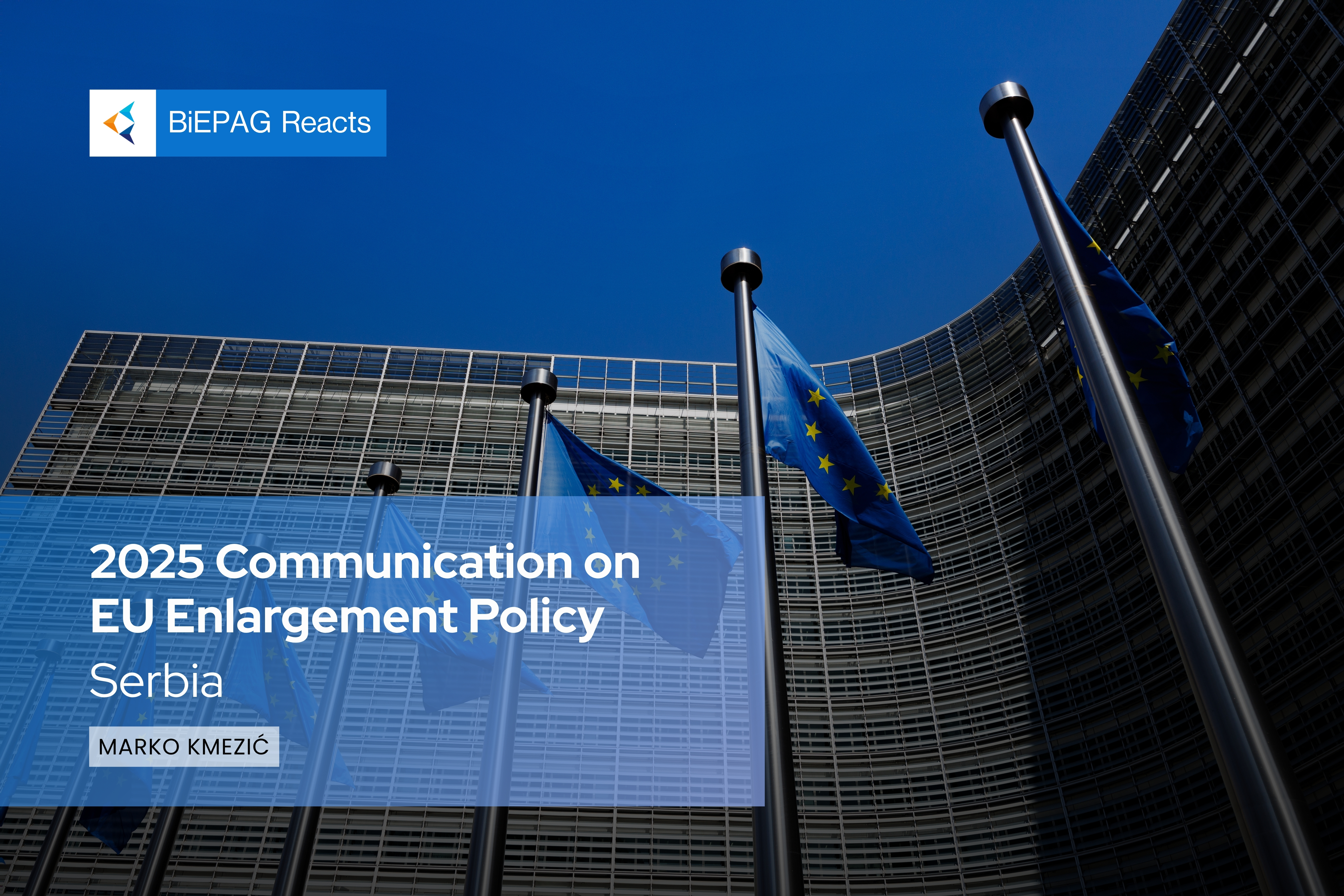

The European Commission has adopted its annual Enlargement Package, providing a comprehensive assessment of Serbia’s progress over the past twelve months. The report comes just three days after the first anniversary of the Novi Sad tragedy, which sparked ongoing student and civic protests that have exposed the undemocratic practices of the ruling Serbian Progressive Party (SNS).
Unlike other recent pro-democracy protest movements in Europe, such as those in Georgia and Slovakia, the Serbian case stands out: many citizens perceive the EU as a passive observer—or even as supportive—of President Aleksandar Vučić. The EU’s unwillingness to use its leverage to ensure a fair democratic process in Serbia has led to disappointment and frustration, even among the country’s most ardent pro-EU supporters.
It was only after the brutal wave of state-influenced violence, intimidation, and indiscriminate arrests over the summer that the wheels in Brussels finally began to turn. European Commission President Ursula von der Leyen has since implied that the bloc requires tangible progress on rule-of-law reforms and media freedom; the European People’s Party is re-examining the membership of Vučić’s SNS within its ranks; and the European Parliament has adopted a resolution condemning the growing polarisation and repression in Serbia, with lawmakers increasingly outspoken in their criticism of Belgrade.
In such a context, this year’s Serbia Progress Report was awaited with slightly more anticipation than in previous years. But how far does the current report depart from the past practice of “business as usual” in assessing Serbia’s preparedness to join the EU?
At first glance, the report uses harsher rhetoric against the official Belgrade and recognizes new political reality in Serbia by describing the growing polarisation in Serbian society against the background of mass protests taking place since November 2024. The report reflects disappointment of citizens over corruption and the perceived lack of accountability and transparency at government level coupled with instances of excessive use of force against protestors and pressure on civil society. The Commission acknowledges that this has led to an increasingly difficult environment where divisive rhetoric has led to a serious erosion of trust amongst the stakeholders which, in turn, impacts the accession process.
Among key takeaways is the Commission’s concern regarding the implementation of the legislative and institutional framework for upholding fundamental rights. In this regard, the report acknowledges that the safety of participants in civic protests was not always guaranteed and notes violent incidents against demonstrators and journalists, including cases of excessive use of force by the police.
Backsliding was observed only in one key area – freedom of expression. Here the Commission earmarked numerous problems including recurrent statements by high-level officials on the work of journalists, SLAPPs, inconcistent implementation of media laws, political and economic influence on the media including its editorial policy and passive work of media regulator (REM).
It is also noteworthy to examine Serbia’s assessment in the area of the EU’s Common Foreign, Security, and Defence Policy. High-level and frequent bilateral contacts with Russia, combined with recurrent anti-Western narratives, are said to raise questions about Serbia’s strategic direction. Additionally, Serbia’s 2024 Free Trade Agreement with China is described as a strategic concern for the EU. Contrary to expectations that Serbia’s lack of alignment with EU sanctions against Russia would occupy a more prominent place in the report, the finding is presented in a more measured tone, noting that Serbia has also continued cooperating with the EU in providing support to Ukraine.
Nevertheless, across many other fields, EU’s descriptive assessments of progress still remain largely based on government promises and adopted action plans, rather than on observed realities on the ground, thereby reinforcing criticism that the process is a mere tick-box exercise. For example, in the area of the fight against corruption, the Commission notes that corruption remains widespread and a serious cause for concern. It points out that the canopy collapse at Novi Sad railway station triggered the perceived lack of accountability and transparency in government infrastructure and construction projects, while stronger political will to tackle high-level corruption remains absent. The report even acknowledges that the role and mandate of the Prosecutor’s Office for Organised Crime are insufficiently regulated in law. Nevertheless, it still declares “limited progress” in this field, citing the adoption of the national anti-corruption strategy and its accompanying action plan for 2024–2025.
Despite harsher wording, statistically, Serbia has largely maintained the status quo in terms of its readiness for EU membership. The average grade of 3.12 represents a slight increase of 0.01 points compared to last year. Similarly, the country remains firmly constrained in its ability to catch up with the current wave of enlargement enthusiasm surrounding the launch of this year’s progress reports.
Overall, the 2025 Serbia Progress Report appears to accurately reflect the mixed picture of formal progress in meeting EU requirements alongside the continued absence of substantial reform, which, coupled with a year-long wave of anti-government protests, has drawn sustained criticism against the government in Belgrade. While remaining within the bounds of diplomatic language, the Commission nevertheless adopts a noticeably harsher tone toward Aleksandar Vučić and his regime.
Yet, as in many previous instances, while the Commission demonstrates a strong understanding of problems on the ground, it has consistently been successful at diagnosing the issues but less effective at prescribing the solutions. In other words, this year’s report clearly depicts a regime that continuously violates the fundamental freedoms of its citizens, including the basic principle of free and fair elections. Nevertheless, it falls short of calling a spade a spade and of naming and shaming those responsible for the observed reality. Such accountability is needed not only to restore credibility to the enlargement process but also to rebuild the trust of Serbian citizens in the EU.